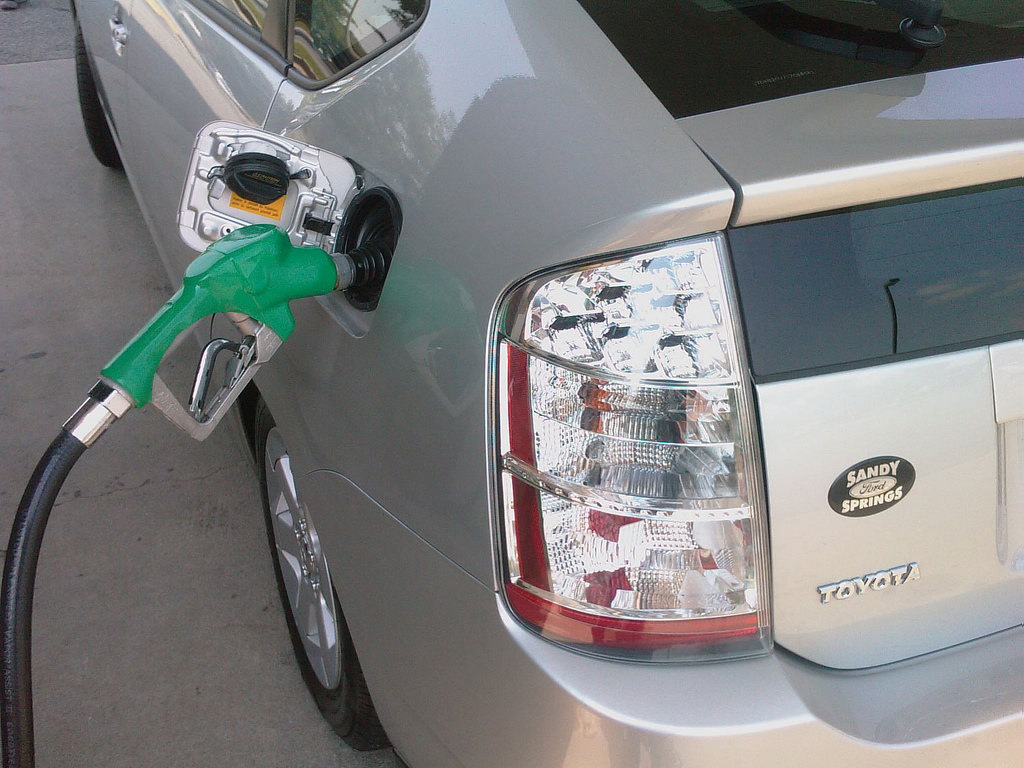There are at least 12 car companies currently selling an all-electric vehicle in the United States, and Toyota isn’t one of them. Despite admitting recently that the Tesla Model 3 alone is responsible for half of Toyota’s customer defections in North America — as Prius drivers transition to all-electric — the company has been an outspoken laggard in the race to electrification.
Now, the company is using questionable logic to attempt to justify its inaction on electrification, claiming that its limited battery capacity better serves the planet by producing gasoline-electric hybrids.
For years, Toyota leadership has shunned investment in all-electric cars, laying out a more conservative strategy to “electrify” its fleet — essentially doubling down on hybrids and plug-in hybrids — as a bridge to a future generation of hydrogen fuel cell vehicles. As Tesla, Nissan, and GM have led the technological shift to fully battery electric vehicles, Toyota has publicly bashed the prospects of all-electric fleets. (See, for instance, the swipe the company took at plug-in vehicles in this recent Toyota Corolla Hybrid commercial.)
Last week, at the Geneva Auto Show, a Toyota executive provided a curious explanation for the company’s refusal to launch a single battery electric vehicle. As Car and Driver reported, Toyota claims that it is limited by battery production capacity and that “Toyota is able to produce enough batteries for 28,000 electric vehicles each year — or for 1.5 million hybrid cars.”
In other words, because Toyota has neglected to invest in battery production, it can only produce enough batteries for a trivial number of all-electric vehicles.
Due to this self-inflicted capacity shortage, the company is forced to choose between manufacturing 1.5 million hybrids or 28,000 electric cars. Using what Car and Driver called “fuzzy math,” the company tried to justify the strategy to forgo electric vehicles (EVs) on environmental grounds.
As Toyota explained it, “selling 1.5 million hybrid cars reduces carbon emissions by a third more than selling 28,000 EVs.”
Toyota’s Conservative Strategy Twisted to Bash Electric Cars
Toyota’s claims were twisted into a remarkably irresponsible headline in PCMag.com and Mashable, which claimed “Toyota says selling fully electric vehicles is less eco-friendly.”
However, the company’s claim only pertains to Toyota’s business model, which is limited by the company’s own decisions not to invest in battery technology. It also accepts that the company cannot procure batteries elsewhere in the near term, as some other carmakers are doing. (For instance, Hyundai and GM both contract with LG for battery packs for the new Kona Electric and the Chevy Bolt, respectively.)
The “fuzzy math” that justifies Toyota’s anti-EV strategy on environmental grounds also relies on a few very questionable assumptions.
Though Toyota didn’t provide details, the calculation seems to assume that for every hybrid sold, a fully gasoline-powered car would be taken off the road. In reality, many Toyota hybrid buyers are replacing a Toyota hybrid. And, based on Toyota’s own revelation that they are losing Prius drivers to Tesla, it stands to reason that many Toyota hybrid drivers would jump at the opportunity to transition to an all-electric Toyota.
Ultimately, Toyota’s strategic decision to invest in gasoline-electric hybrids and bet on fuel cells in the long term is the reason that it isn’t currently producing any electric cars. The once-innovative company that mainstreamed hybrid-electric technology is now a global laggard in electrification, and is using dubious logic to justify its gas-powered fleet on environmental grounds.
By no reasonable measure is Toyota’s fleet more eco-friendly without a single all-electric model. Electric cars are cleaner and greener from cradle-to-grave, including battery production, and regardless of where they charge.
Main image: A Toyota Prius as the gas station. Credit: Listener42, CC BY 2.0
Subscribe to our newsletter
Stay up to date with DeSmog news and alerts







